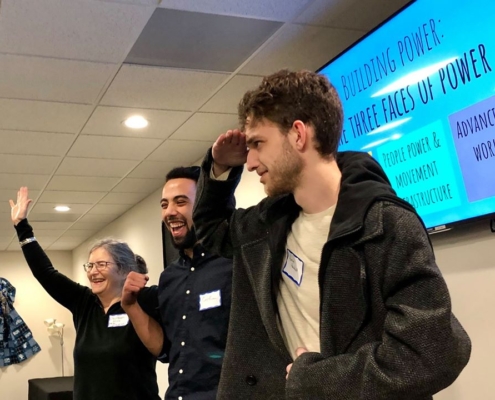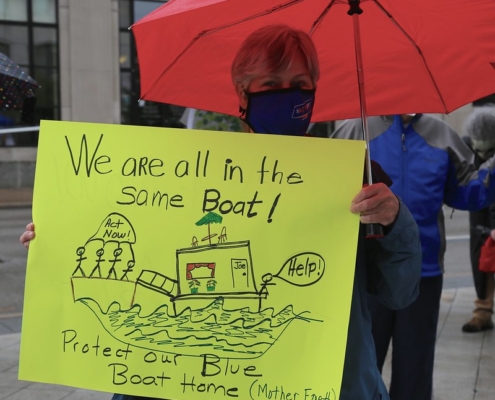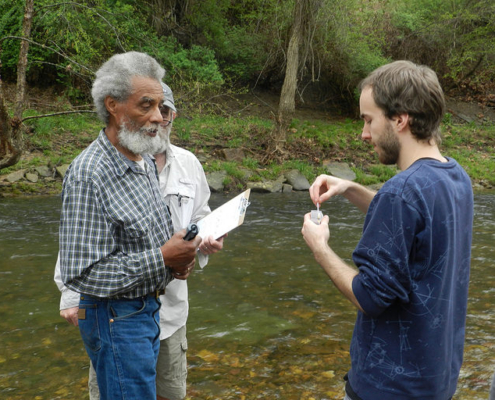About West Virginia Rivers Community Action Mini-Grant Program
WV Rivers is here to support YOUR efforts in YOUR community!
The WV Rivers Community Action Mini-Grant Program supports communities growing collective power to influence decision makers and secure safe, healthy water for all.
Since 2019, WV Rivers has provided more than $78,000 to support 46 projects to improve water quality and awareness across the state. Through our mini-grant program, WV Rivers has supported dozens of powerful grassroots projects across the state — defending headwaters, uplifting frontline voices, and taking real action on clean water and climate. Grants have:
- Powered marches for justice in Minden, policy summits on chemical safety, and Black Policy Day at the Capitol
- Funded PFAS testing and air monitoring in impacted communities from the Eastern Panhandle to Wyoming County
- Supported pipeline resistance, coal mine monitoring, and advocacy for safe drinking water
- Enabled youth-led engagement at E-Day, community art like murals and mapping, and clean-ups on the Little Coal and Town Run
- Boosted rain barrel workshops, leadership retreats, and climate education through faith-based outreach
- Backed efforts to fight harmful development, from the Kanawha Forest to the Corridor H highway
Whether it’s helping to upgrade Big Laurel Learning Center’s rain cistern and supporting their water policy advocacy lessons or helping neighbors in crisis through From Below’s water distribution in southern West Virginia, these mini-grants are more than dollars — they’re a spark for justice, resilience, and community-powered change.
This Fund is a project of the West Virginia Rivers Coalition and provides small grants to grassroots groups and advocates working toward social change on environmental justice issues related to the presence of industrial pollution in their immediate communities and more. This fund is made possible by The Cloud Mountain Foundation, The Justice and Peace Fund, The Heinz Foundation, Erol Foundation, and Beyond Petrochemicals, a project of Resources Legacy Fund made possible by support from Bloomberg Philanthropies. This program is also made possible by the support of individual donors – people like you who share our belief that small, localized actions can make a powerful difference.
Want to apply for West Virginia Rivers Community Action Mini-Grant Program?
Proposals will be considered in January, March, June, August, and October and awarded by the 15th of each month. A final completion form is required within 30 days of project completion.
Note: June applications are due on June 15 and will be awarded by the 30th.
Applications received after the deadline will be considered in the following month’s grant cycle.
Our next application due date is:
June 15, 2025
What you should know before you apply
Our awards committee strongly prioritizes:
- Proposals up to $2,500
- Proposals from groups organizing in directly impacted communities in West Virginia
- Proposals seeking to address environmental harms and/or environmental justice issues
- Proposals must include a clear advocacy component, such as efforts to influence policy, shift public opinion, build community power, or advance environmental protections through civic engagement or grassroots organizing. Past examples include: letter-writing campaigns to elected officials, community meetings, rallies or marches, petition drives, etc.
- Proposals from groups with annual budgets not exceeding $50,000; however, proposals from groups with an annual budget between $75,000 and $100,000 will be considered.
- Projects that seek to organize, inform, or educate community members about the impacts of shale gas and petrochemical development (including gas wells, pipelines, compressor stations, refineries, cracker plants, and other related infrastructure)
- Projects organizing, educating, or mitigating around the harms of coal field extraction, buildout, and/or pollution.
- Projects focused on developing new community leadership, collective strategizing or problem solving, community outreach, or those that support direct action
- Projects that are led by systemically under-represented and under-funded communities (i.e. people of color, rural, and under resourced)
- Activities pursued in collaboration with other activists, groups or communities
- Travel and/or conference expenses for events that increase networking, strategizing, and communication among activists or grassroots groups.
- Funds being used for matching grants
We do not consider:
- Personal Expenses: This includes requests for relief for specific households, such as healthcare costs, temporary housing, or other personal needs.
- Operating Expenses: Funds cannot be used for general operating costs such as rent, utility bills, or permanent staff salaries, unless directly tied to the proposed project.
- Political Activities: Funds may not be used to support or oppose political candidates, parties, or for lobbying efforts beyond what is permissible under nonprofit advocacy guidelines.
- Private Interest or Profit-Making: Projects that primarily benefit private businesses, individuals, or for-profit entities are not eligible.
- Individuals: Grants are only available to organizations, not individuals applying on their own behalf.
- Attorney Fees: Legal fees are not eligible, though limited legal-related costs such as printing, filing fees, or support for expert witnesses may be considered.
- Incomplete Applications: Applications missing required information or documentation will not be considered.
Will You Need a Fiscal Sponsor?
If you are a grassroots group but are not incorporated and do not have a bank account, you will need to find an organization that can accept the funds for your group. Consider asking another non-profit or a faith-based organization if they will serve as your “Fiscal Sponsor.”
Note: All applicants who are approved will be required to submit a W-9 form and MOU before funding is dispersed.
Simple Reporting, Centered on Your Work
We keep reporting simple — because we want you to spend more time healing and organizing in your community, not meeting grant deadlines.
When your project wraps up, just complete a short form that asks a few basic questions about what you accomplished, any challenges you encountered, and how the funds were used. It’s designed to be quick and easy. We also encourage you to share photos or videos that highlight your work. These help us celebrate and promote your efforts across the state.
That’s it! If you have any questions, we’re always here to help!
How WV Rivers Supports Grantees
Mini-grant recipients receive more than just funding — we offer ongoing support to help your project succeed:
- Optional Peer Learning Cohorts: You’ll join a small cohort of 2–3 other grantees to share progress, troubleshoot challenges, and learn from one another with light facilitation from WV Rivers.
- Science & Technical Support: Access to staff scientists and policy experts for help with water monitoring, data interpretation, and technical questions.
- Organizing Support: Assistance with community outreach, advocacy strategies, and campaign planning.
- Communications Support: Guidance on messaging, media outreach, and amplification through WV Rivers’ platforms.
Our goal is to support strong, informed, and connected local leaders across West Virginia.
Please complete our application for consideration! If you need assistance filling out the application, please contact the Community Engagement Team at minigrant@wvrivers.org or call us at 304- 637-7201.
Need Rapid Response Support?
We understand that urgent situations arise — whether it’s a time-sensitive matching grant opportunity or mutual aid in response to a crisis. WV Rivers considers rapid response projects on a case-by-case basis and may be able to offer expedited support.
If you believe your project qualifies, please reach out to us directly at minigrant@wvrivers.org before submitting an application.





